1. Define the functional style, the type

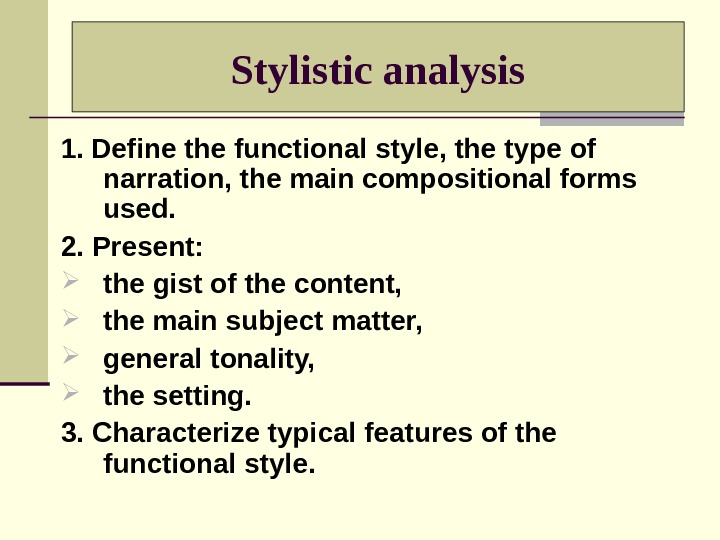
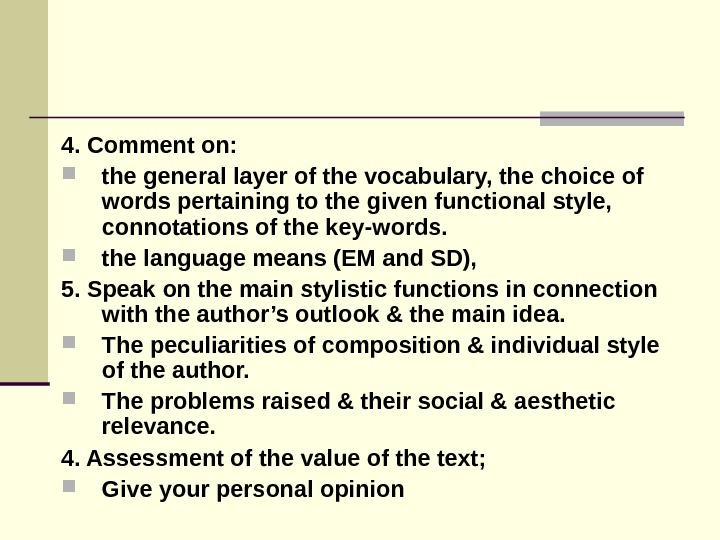
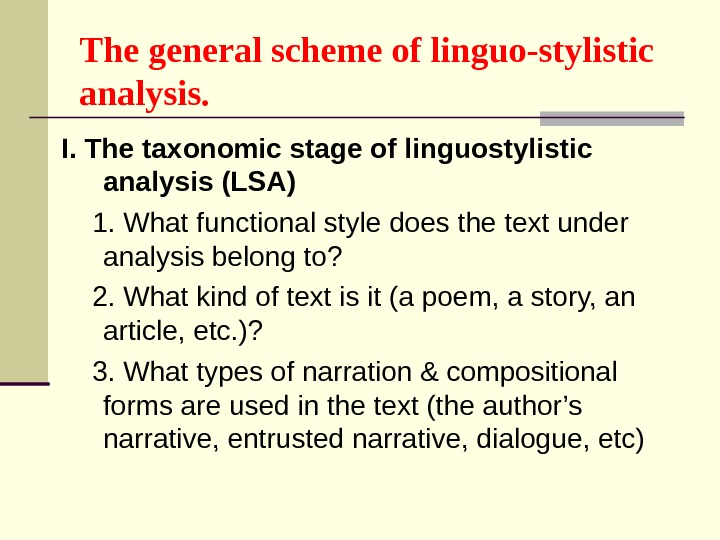
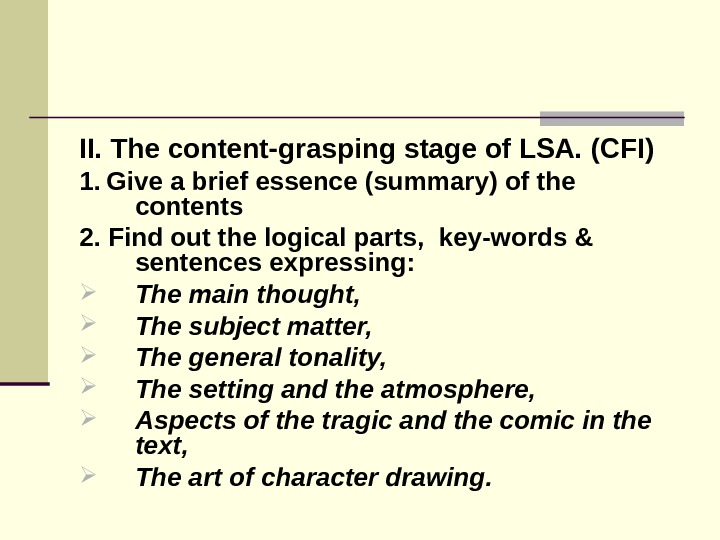
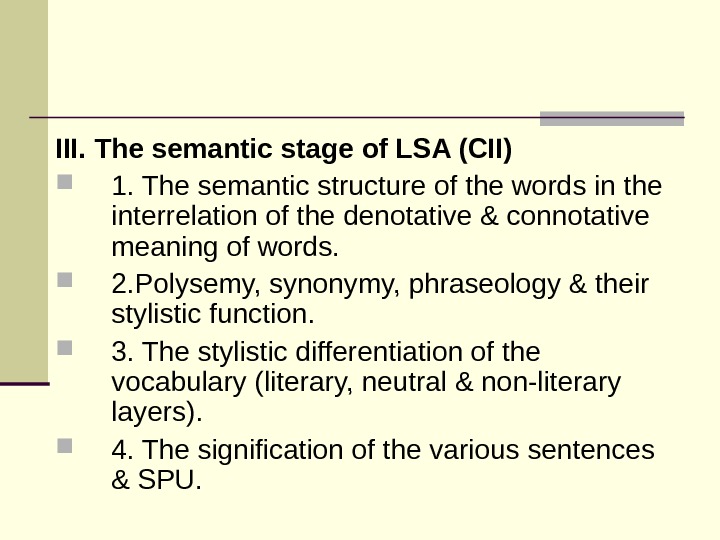
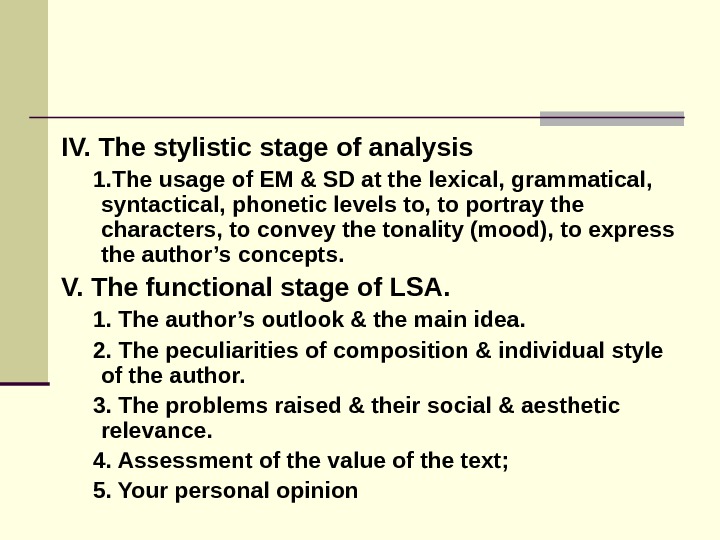
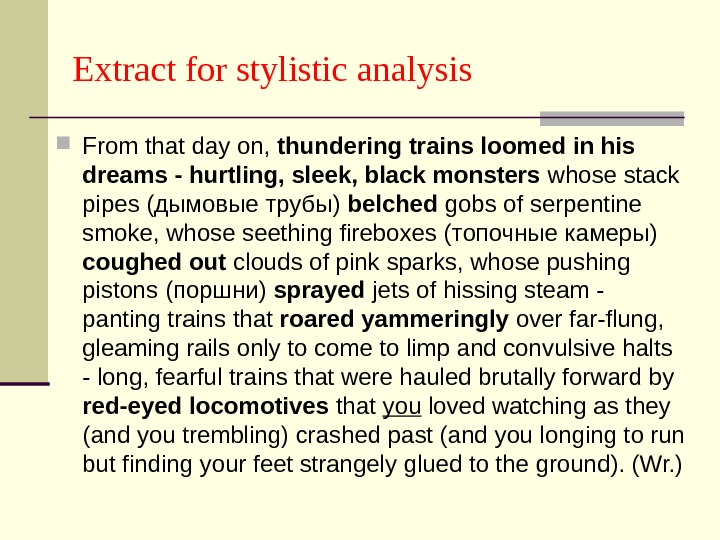
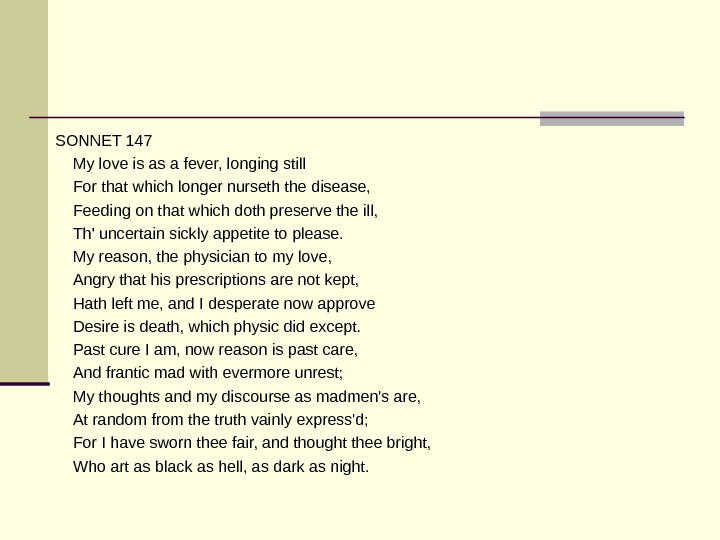
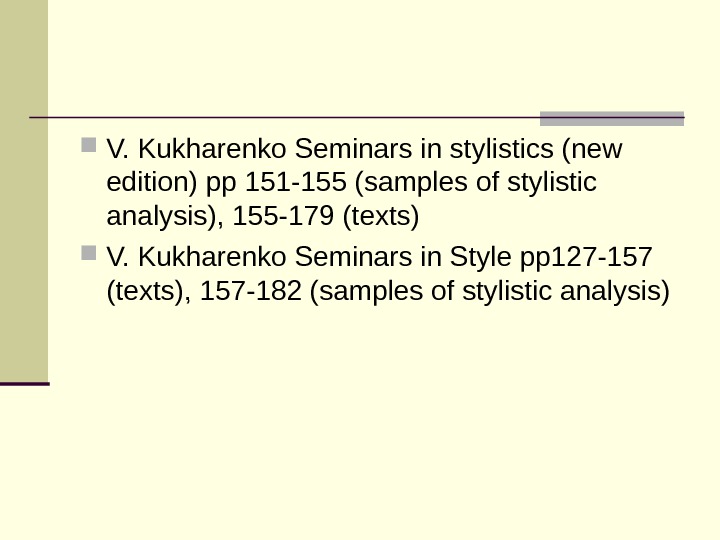
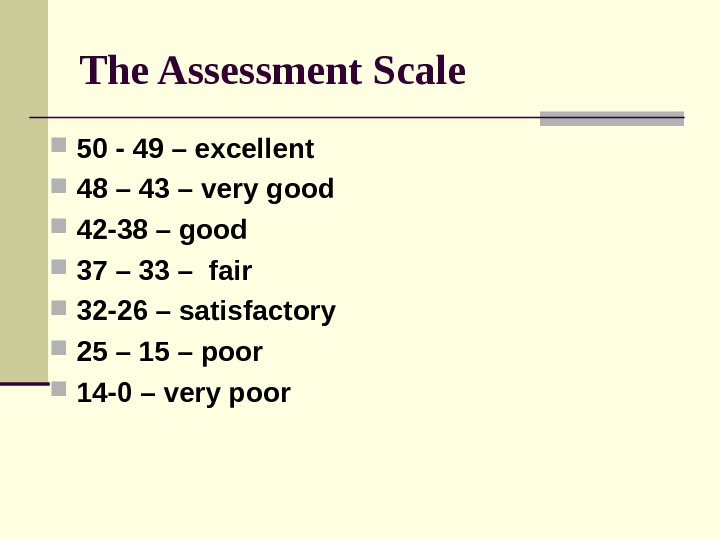
- Размер: 157.5 Кб
- Количество слайдов: 10
Описание презентации 1. Define the functional style, the type по слайдам
 1. Define the functional style, the type of narration, the main compositional forms used. 2. Present: the gist of the content, the main subject matter, general tonality, the setting. 3. Characterize typical features of the functional style. Stylistic analysis
1. Define the functional style, the type of narration, the main compositional forms used. 2. Present: the gist of the content, the main subject matter, general tonality, the setting. 3. Characterize typical features of the functional style. Stylistic analysis
 4. Comment on: the general layer of the vocabulary, the choice of words pertaining to the given functional style, connotations of the key-words. the language means (EM and SD), 5. Speak on the main stylistic functions in connection with the author’s outlook & the main idea. The peculiarities of composition & individual style of the author. The problems raised & their social & aesthetic relevance. 4. Assessment of the value of the text; Give your personal opinion
4. Comment on: the general layer of the vocabulary, the choice of words pertaining to the given functional style, connotations of the key-words. the language means (EM and SD), 5. Speak on the main stylistic functions in connection with the author’s outlook & the main idea. The peculiarities of composition & individual style of the author. The problems raised & their social & aesthetic relevance. 4. Assessment of the value of the text; Give your personal opinion
 The general scheme of linguo-stylistic analysis. I. The taxonomic stage of linguostylistic analysis (LSA) 1. What functional style does the text under analysis belong to? 2. What kind of text is it (a poem, a story, an article, etc. )? 3. What types of narration & compositional forms are used in the text (the author’s narrative, entrusted narrative, dialogue, etc)
The general scheme of linguo-stylistic analysis. I. The taxonomic stage of linguostylistic analysis (LSA) 1. What functional style does the text under analysis belong to? 2. What kind of text is it (a poem, a story, an article, etc. )? 3. What types of narration & compositional forms are used in the text (the author’s narrative, entrusted narrative, dialogue, etc)
 II. The content-grasping stage of LSA. (CFI) 1. Give a brief essence (summary) of the contents 2. Find out the logical parts, key-words & sentences expressing: The main thought, The subject matter, The general tonality, The setting and the atmosphere, Aspects of the tragic and the comic in the text, The art of character drawing.
II. The content-grasping stage of LSA. (CFI) 1. Give a brief essence (summary) of the contents 2. Find out the logical parts, key-words & sentences expressing: The main thought, The subject matter, The general tonality, The setting and the atmosphere, Aspects of the tragic and the comic in the text, The art of character drawing.
 III. The semantic stage of LSA (CII) 1. The semantic structure of the words in the interrelation of the denotative & connotative meaning of words. 2. Polysemy, synonymy, phraseology & their stylistic function. 3. The stylistic differentiation of the vocabulary (literary, neutral & non-literary layers). 4. The signification of the various sentences & SPU.
III. The semantic stage of LSA (CII) 1. The semantic structure of the words in the interrelation of the denotative & connotative meaning of words. 2. Polysemy, synonymy, phraseology & their stylistic function. 3. The stylistic differentiation of the vocabulary (literary, neutral & non-literary layers). 4. The signification of the various sentences & SPU.
 IV. The stylistic stage of analysis 1. The usage of EM & SD at the lexical, grammatical, syntactical, phonetic levels to, to portray the characters, to convey the tonality (mood), to express the author’s concepts. V. The functional stage of LSA. 1. The author’s outlook & the main idea. 2. The peculiarities of composition & individual style of the author. 3. The problems raised & their social & aesthetic relevance. 4. Assessment of the value of the text; 5. Your personal opinion
IV. The stylistic stage of analysis 1. The usage of EM & SD at the lexical, grammatical, syntactical, phonetic levels to, to portray the characters, to convey the tonality (mood), to express the author’s concepts. V. The functional stage of LSA. 1. The author’s outlook & the main idea. 2. The peculiarities of composition & individual style of the author. 3. The problems raised & their social & aesthetic relevance. 4. Assessment of the value of the text; 5. Your personal opinion
 Extract for stylistic analysis From that day on, thundering trains loomed in his dreams — hurtling, sleek, black monsters whose stack pipes ( дымовые трубы ) belched gobs of serpentine smoke, whose seething fireboxes (топочные камеры) coughed out clouds of pink sparks, whose pushing pistons (поршни) sprayed jets of hissing steam — panting trains that roared yammeringly over far-flung, gleaming rails only to come to limp and convulsive halts — long, fearful trains that were hauled brutally forward by red-eyed locomotives that you loved watching as they (and you trembling) crashed past (and you longing to run but finding your feet strangely glued to the ground). (Wr. )
Extract for stylistic analysis From that day on, thundering trains loomed in his dreams — hurtling, sleek, black monsters whose stack pipes ( дымовые трубы ) belched gobs of serpentine smoke, whose seething fireboxes (топочные камеры) coughed out clouds of pink sparks, whose pushing pistons (поршни) sprayed jets of hissing steam — panting trains that roared yammeringly over far-flung, gleaming rails only to come to limp and convulsive halts — long, fearful trains that were hauled brutally forward by red-eyed locomotives that you loved watching as they (and you trembling) crashed past (and you longing to run but finding your feet strangely glued to the ground). (Wr. )
 SONNET 147 My love is as a fever, longing still For that which longer nurseth the disease, Feeding on that which doth preserve the ill, Th’ uncertain sickly appetite to please. My reason, the physician to my love, Angry that his prescriptions are not kept, Hath left me, and I desperate now approve Desire is death, which physic did except. Past cure I am, now reason is past care, And frantic mad with evermore unrest; My thoughts and my discourse as madmen’s are, At random from the truth vainly express’d; For I have sworn thee fair, and thought thee bright, Who art as black as hell, as dark as night.
SONNET 147 My love is as a fever, longing still For that which longer nurseth the disease, Feeding on that which doth preserve the ill, Th’ uncertain sickly appetite to please. My reason, the physician to my love, Angry that his prescriptions are not kept, Hath left me, and I desperate now approve Desire is death, which physic did except. Past cure I am, now reason is past care, And frantic mad with evermore unrest; My thoughts and my discourse as madmen’s are, At random from the truth vainly express’d; For I have sworn thee fair, and thought thee bright, Who art as black as hell, as dark as night.
 V. Kukharenko Seminars in stylistics (new edition) pp 151 -155 (samples of stylistic analysis), 155 -179 (texts) V. Kukharenko Seminars in Style pp 127 -157 (texts), 157 -182 (samples of stylistic analysis)
V. Kukharenko Seminars in stylistics (new edition) pp 151 -155 (samples of stylistic analysis), 155 -179 (texts) V. Kukharenko Seminars in Style pp 127 -157 (texts), 157 -182 (samples of stylistic analysis)
 The Assessment Scale 50 — 49 – excellent 48 – 43 – very good 42 -38 – good 37 – 33 – fair 32 -26 – satisfactory 25 – 15 – poor 14 -0 – very poor
The Assessment Scale 50 — 49 – excellent 48 – 43 – very good 42 -38 – good 37 – 33 – fair 32 -26 – satisfactory 25 – 15 – poor 14 -0 – very poor

